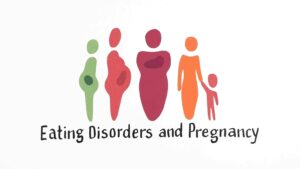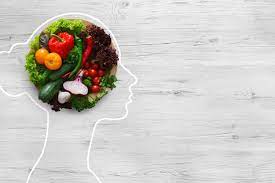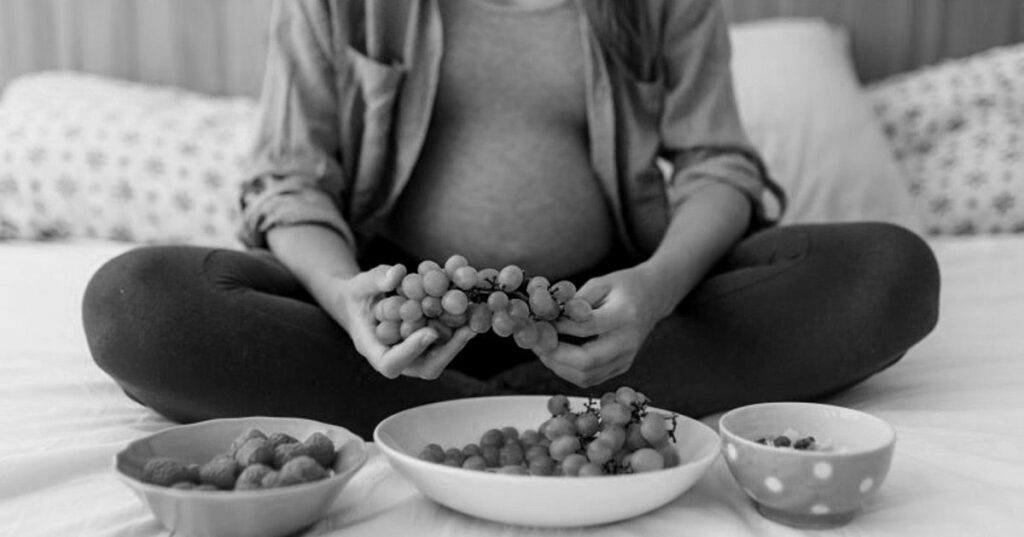If you are pregnant and struggling with an eating disorder, you are not alone. Eating disorders during pregnancy are more common than you may think. In fact, an estimated 1 in 4 pregnant women struggles with some type of eating disorder. This can be a difficult time for both the mother and her baby, so it is important to get the right information and treatment. In this blog post, we will discuss the dangers of eating disorders during pregnancy and what you can do to get help.
Contents
Understanding Eating Disorders And Pregnancy
 Eating disorders are serious, potentially life-threatening illnesses that are characterized by abnormal eating habits and severe distress or concern about body weight or shape. Eating disorders affect people of all ages, genders, races, and socioeconomic backgrounds.
Eating disorders are serious, potentially life-threatening illnesses that are characterized by abnormal eating habits and severe distress or concern about body weight or shape. Eating disorders affect people of all ages, genders, races, and socioeconomic backgrounds.
There are three main types of eating disorders: anorexia nervosa, bulimia nervosa, and binge-eating disorder. Each type is characterized by different behaviors and symptoms. And each can be really distressing for both the person experiencing the disorder and their loved ones.
During pregnancy, an eating disorder can pose serious risks to both the mother and the developing baby. That’s why it’s important for pregnant women with eating disorders to get treatment. Although finding the right time for treatment is important for all eating disorders, it’s especially critical for pregnant women.
How Does Eating Disorder Affect Fertility?
There are a few studies that suggest that women with eating disorders may have difficulty becoming pregnant. One study found that nearly 33% of women with anorexia nervosa had amenorrhea, which is the absence of a menstrual period. Amenorrhea can be a result of low body weight, intense exercise, or psychological stressors.
Anorexia nervosa and bulimia nervosa are the two most common eating disorders that can lead to amenorrhea. Both of these disorders involve restricting food intake, which can lead to low body weight and a loss of menstrual periods.
However, women with irregular periods assume they can’t get pregnant when in fact they can. If you have an eating disorder and are trying to become pregnant, it’s important to talk to your doctor about your concerns. They can help you understand how your eating disorder may be affecting your fertility. And recommend treatment options.
So, while there is some evidence to suggest that eating disorders may affect fertility, it’s important to talk to your doctor if you’re trying to become pregnant.
Do Pregnancy Impact Eating Disorders?
 If you are pregnant and have an eating disorder, you may be wondering how pregnancy will impact your disorder. Pregnancy can be a difficult time for women with eating disorders. Also, it is the time when women feel anxious and stressed about their bodies.
If you are pregnant and have an eating disorder, you may be wondering how pregnancy will impact your disorder. Pregnancy can be a difficult time for women with eating disorders. Also, it is the time when women feel anxious and stressed about their bodies.
There are many changes that happen to a woman’s body during pregnancy. These changes can trigger eating disorders or make them worse. For example, some women feel they need to be thin to be beautiful. They may diet and exercise too much or use purging behaviors to lose weight.
Other women may overeat or binge eats to cope with stress. This can lead to obesity and other health problems. Some of the changes that can trigger eating disorders during pregnancy include:
- Weight gain
- Body changes
- Stretch marks
- Cellulite
- Hormone changes
- Fatigue
- Emotional changes
So these are some of the things that you should keep in mind if you are pregnant and have an eating disorder. Pregnancy is a time when you need to be extra careful about your health. If you think you may have an eating disorder, please talk to your doctor. Eating disorders can be serious, but with treatment, women with eating disorders can have healthy pregnancies.
What Is The Link Between Eating Disorders And Pregnancy?
The link between eating disorders and pregnancy is not fully understood. However, there are some potential risks associated with having an eating disorder while pregnant. Moreover, there have been studies that suggest that there is a link between eating disorders and pregnancy. For example, one study found that women with anorexia nervosa were more likely to have a baby with low birth weight.
There are some potential risks associated with having an eating disorder while pregnant. These include:
- Dehydration: This can lead to serious complications, such as premature labor or low birth weight.
- Malnutrition: This can cause problems with the development of the baby, including birth defects.
- Electrolyte imbalance: This can lead to problems with the heart and other organs.
Eating disorders and pregnancy can also lead to other problems, such as:
- Anxiety and depression: This can make it difficult to bond with your baby.
- Problems with the placenta: This can cause bleeding during pregnancy or after delivery.
So, overall the link between eating disorders and pregnancy is not fully understood. However, these are some potential risks that you should be aware of if you are pregnant and have an eating disorder.
In addition, if you are pregnant and have an eating disorder, it is important to seek help from a doctor or therapist who can provide you with support and treatment. Because during pregnancy, it is not only about you but also about the health of your baby. So, if you are struggling with an eating disorder, please seek help.
How To Manage Eating Disorders And Pregnancy Together?
 It is often said that pregnancy is a time when you should be eating for two. But what if you have an eating disorder? What then?
It is often said that pregnancy is a time when you should be eating for two. But what if you have an eating disorder? What then?
Eating disorders and pregnancy can be a tricky combination. On the one hand, you want to make sure you’re getting enough nutrients to support your growing baby. But on the other hand, you may be struggling with disordered eating habits that make it hard to eat enough.
If you’re pregnant and struggling with an eating disorder, know that you’re not alone. Many women face this challenge every day. But there is help available.
Here are some tips for managing eating disorders and pregnancy:
Talk to your doctor or midwife
This is the first step. Be open and honest about your eating disorder with your healthcare provider. They can help you come up with a plan to make sure you’re getting the nutrition you need. Moreover, they can provide emotional support and connect you with resources to help you through this difficult time. And you should be aware of the fact that there are medications available that can help with both the eating disorder and pregnancy.
You don’t have to go through this alone. Talk to your partner, friends, and family about your struggle. Let them know how they can help you. It may be helpful to join a support group for women with eating disorders.
Talk to a therapist
If you’re not already in therapy, now is the time to start. A therapist can help you understand and manage your eating disorder. They can also provide much-needed support during pregnancy. A mental health professional or a registered dietitian with experience in eating disorders can be a great resource.
There are several therapy options available, including cognitive-behavioral therapy (CBT), which has been shown to be effective in treating eating disorders. A professional will guide you about what’s best for you.
Focus on nutrition
 Eating disorders can make it hard to get the nutrients you need. This is especially true during pregnancy when your body needs more vitamins and minerals than usual.
Eating disorders can make it hard to get the nutrients you need. This is especially true during pregnancy when your body needs more vitamins and minerals than usual.
You may need to take a prenatal vitamin supplement to make sure you’re getting enough of the nutrients you need. You should also eat a variety of healthy foods from all the food groups. This includes:
- lean protein,
- fruits and vegetables,
- whole grains, and
- low-fat dairy.
Join a support group
Support groups provide a space to share your experiences and connect with other women who are going through similar challenges. This can be an invaluable resource during pregnancy. In fact, there are even some groups specifically for pregnant women with eating disorders. You just need to do a little research to find one near you. Some groups are led by a mental health professional, while others are peer-led.
Get enough sleep
Sleep is important for everyone, but it’s especially crucial for pregnant women. When you’re sleep-deprived, your body doesn’t function as well. This can make it harder to stick to a healthy diet and manage your eating disorder. Make sure you’re getting enough rest every night. There are even some apps that can help you track your sleep.
Practice exercise
Moderate exercise is a great way to reduce stress and improve your mood. It can also help you sleep better. Just be sure to talk to your doctor before starting any new exercise routine, especially if you’re not used to being active. Exercising is a way of life. It is not only a means to an end.
Start by doing what you can and gradually increase the intensity and duration of your workouts as you feel more comfortable. If possible, try to find a workout buddy or join a class to make it more enjoyable.
Set realistic goals
One of the most important things you can do for yourself is to set realistic goals. Pregnancy is not the time to try to lose weight. In fact, most women actually gain weight during pregnancy.
Instead of fixating on the scale, focus on eating a nutritious diet and staying active. These are much more important for both you and your baby. In fact, realistic goals are important for anyone struggling with an eating disorder. For example, a goal to eat three meals a day, even if they’re small, is more attainable than a goal to lose 20 pounds.
Deep breathing exercises
This is one of the most effective ways to ease anxiety and stress. It helps to improve blood circulation, which is important for a pregnant woman. When you feel a panic attack coming on, take deep breaths through your nose and exhale through your mouth slowly. Repeat this several times until you feel calmer. In fact, in pregnancy, deep breathing can also help to prevent or relieve nausea.
Yoga
Another great way to combat stress and anxiety is through yoga. Yoga helps to improve flexibility, strength, and balance. It also promotes relaxation and can help pregnant women sleep better. There are even specific yoga poses that can help to ease back pain, a common complaint during pregnancy. If you’re new to yoga, there are many resources available to help you get started, including online classes and DVDs.
Prenatal Massage
 Prenatal massage can be a great way to reduce stress and promote relaxation. It can also help to ease some of the common discomforts of pregnancy, such as back pain and swelling. This type of massage is usually performed in a side-lying position, with the woman supported by pillows. It is important to find a qualified prenatal massage therapist who has experience working with pregnant women.
Prenatal massage can be a great way to reduce stress and promote relaxation. It can also help to ease some of the common discomforts of pregnancy, such as back pain and swelling. This type of massage is usually performed in a side-lying position, with the woman supported by pillows. It is important to find a qualified prenatal massage therapist who has experience working with pregnant women.
So these are some of the things to keep in mind if you or someone you know is struggling with an eating disorder and pregnancy. However, with these tips and the help of a qualified professional, it is possible to manage an eating disorder during pregnancy and have a healthy baby.
Conclusion
To conclude, eating disorders and pregnancy is a complex and often difficult topics to navigate. There is no one-size-fits-all answer, and what works for one person may not work for another. Both things are connected and impact the other. For instance, an eating disorder can make it difficult to get pregnant. And, on the other hand, pregnancy can trigger disordered eating behaviors.
If you are struggling with an eating disorder and are thinking about or are currently pregnant, please know that you are not alone. You can contact Mantra Care for more information about both things. The team of expert mental health professionals will provide you with guidance and support. Mantra Care provides mental health services around the globe at convenient and affordable prices. You can also book a therapy or download our free Android or iOS app.
In addition, Mantra Care has a registered dietitian to help you make the best food choices for your journey, as well as a team of highly qualified and certified personal trainers to help you recover from an eating disorder. Visit our website or give us a call today!


